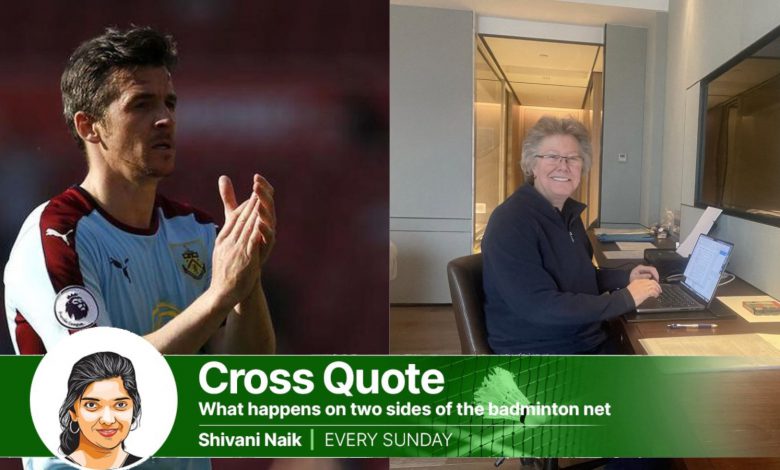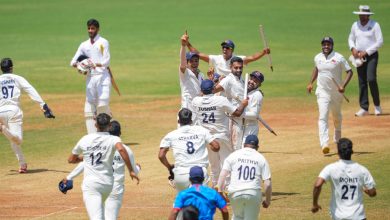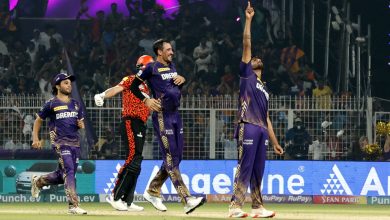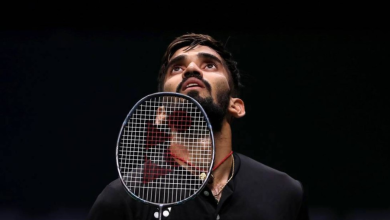Joey Barton can bumble on but stop the ridiculous resance to women commentators calling the men’s game | Badminton News

The serially problematic footballer Joey Barton went on a tirade this last week, blatantly mishearing a piece of commentary to wrongly conclude female presenters and pundits shouldn’t be covering men’s games. His relentless carping Friday, proceeded to reference a game where Wrexham’s retired bunch beat a USA women’s side 12-0. “Retired men on a smaller pitch! But yeah let’s just keep pretending it’s the same game shall we?” he cackled on Twitter.“Last thing we want is people to get their knickers in a tw. The Women’s game is growing and that is amazing. Stop trying to ruin ours!” In his part-patronising, fully-offensive manner, he looks determined to bumble on endlessly about how women should stay away from the men’s game, till people eventually yawn and scroll past whatever it is he continues to spew.
12-0
Retired men on a smaller pitch! 👍
But yeah let’s just keep pretending it’s the same game shall we?
Last thing we want is people to get their knickers in a tw.
The Women’s game is growing and that is amazing.
Stop trying to ruin ours!
❤️💙 https://t.co/LT47mtIvbJ
— Joey Barton (@Joey7Barton) December 15, 2023
Born 21 years before Barton on the same date in September, was English woman Gillian Clark, who won two badminton World Championships bronzes in doubles around the time he was born. Clark’s is a female voice on commentary that noone who watches top-notch badminton can separate from that sport.
This week, she posted a short video clip of her extensive research ahead of World Tour Finals – players backgrounds, their season records, their career hory and matchups. It showed her rigour in preps. Several scribbled sheets of paper needing manual research because badminton doesn’t get match stats readymade fed into comms’ ears backroom analysts, like other sports. Or have entire websites devoted to micro-numbers and filters.
Thought you might be interested to see behind the scenes in preparation for commentary tomorrow.#HangzhouFinals2023 #BWFWorldTourFinals @bwfmedia pic.twitter.com/GiryYjpis1
— Gill Clark aka Oma Gill (@OmaGillClark) December 12, 2023
An individual, Asia-heavy sport, with a fraction of football’s money and speck of its fame, badminton might well have comparable TV viewing figures to what Barton’s Man City did when it was perennially second-best among Manchester clubs. Badminton’s not projected to match even tennis in the next decade and has its fair share of maddening drawbacks. But one thing badminton got spectacularly right thanks in no less part due to Gillian Clark’s peals of wonderment, is viewers being always accustomed to a female brain, calling men’s sport (and of course women’s too).
The thought wouldn’t cross anyone’s mind even, when watching badminton now, that the two games are dinct to call for a separation of expertise, though strength and speed look different. No one is foolish enough to contend that Tai Tzu Ying or An Se Young ought to beat Viktor Axelsen – though there will be wide ranging applause and glee and no surprise at all should they nick a set off him. No one is deluded either about the power-difference, and the fact that statically there might be more smashes in a men’s game. But horically, the women’s badminton game has been viewed as something with additional layers of grace and deception and defensive stamina in doubles. And it’s respected.
Aparna Popat, a cerebral narrator on the mic from India, doesn’t want to trash Barton’s views without hearing them in entirety, and because she didn’t know of his exence till he suddenly went berserk on Twitter sports timelines. But she waves it aside as one opinion amongst ten billion, that had echoes based on preferences one way or another and that started a debate. She politely questions if it deserves attention.
She grew up hearing, ‘girls can’t bat, girls can’t bowl’ in India knowing it to be inaccurate, and stopped taking seriously those who dismissed any women’s sport as “too boring, too slow.” Some opinions are so ridiculous, they don’t deserve a retort. Plus, she played top-flight badminton – same travelling circuit for men and women, equal pay, equal points played, equally awesome set of legends. Never got the fuss of “girls can’t..”. Plus, there was Gillian. And next, it might be her.
The hostility in tennis and football towards women (who have played the sport at the highest level) covering men’s sport, confounds her. It’s a battle that badminton spared women from fighting because it didn’t bother to discriminate and simply got on with five categories, each with its own set of favourites. When cricket gets nasty on its female presenters, Popat can’t help guffawing: “Indian girls watch so much men’s cricket, read so much of it. Boss, we are bombarded it. We almost don’t know anything else! Any Indian girl will get good at it, if she puts her mind to it. It’s the men who have a lot of catching up to do if they want to make a living out of talking on women’s cricket.” Not quite written tests for eligibility, but she asks pertinently of men, “You don’t even watch enough women’s sport to qualify to talk on it.”
Badminton’s tri-tangoing act in the comms – Steen Pedersen and Morten Frost, have been ace champs or coached women, and their camaraderie with Gill Clark, matching wavelengths lead to subtle banter and plenty of insights across mens, womens, singles and doubles categories. Commentary hygiene, Popat says, involves not talking over points or over one another, not picking sides and calling it fairly. Men’s matches and women’s are mere orders of play.
Getting in pithy remarks and that one line of impact and growing your own style is what it’s all about. Women are equally adept at reading nuances and psychology of players – decoding a nervous guy or a temperamentally strong woman, while vocabulary is an individual trait. A trained eye will not dwell too much on drift conditions to undermine player skills, and will spot strategic breaks like shoe laces coming undone and hair clips being adjusted. But facts are facts, stats are stats, tricks are tricks, and both men and women are adept at talking technique in those. Barton’s presumption that one needs to have played the men’s game to be eligible to call it, simply sounds laughable in shuttle.
Popat watched two male commentators crying tears of joy after India won the hockey bronze at Tokyo, and she remembers choking up and putting the mic down when India won the Thomas Cup. Emotions only add to the experience, she reckons, in sport. “It’s the style of delivery that counts. Saying women are emotional and men aren’t is a stereotype,” she says. A commentary success sometimes is about validating what’s on the viewer’s mind. At other times, it’s pointing to something no-one else noticed. Different styles get liked.
While badminton’s commentators are often made aware those watching of their European biases with Asian viewers quick and frank to point it out, Popat thinks “too flat” or “too loud” are individual preferences, and nothing to do with gender. And these cannot determine if one is good or bad at calling games. Men do hold an advantage of networking, socialising with male athletes over a drink or dropping into dressing rooms, but it is minimal.
She must have said it a thousand times, for that’s her strong template. But even the 1001st rendition of “I don’t be-llllieve it” from Gill Clark can carry the entire badminton universe along with her on the incredible adventure of the preceding point, relived through her 4-word exclamation. Gillian in shuttle’s Wonderland is a curious pair of eyes enthusiastically nudging you to fall in love with badminton. Yes, it’s a woman’s voice, and badminton might consider itself terrifically lucky for it, given how some other sports are mired in ridiculous resance to women calling the men’s game.







